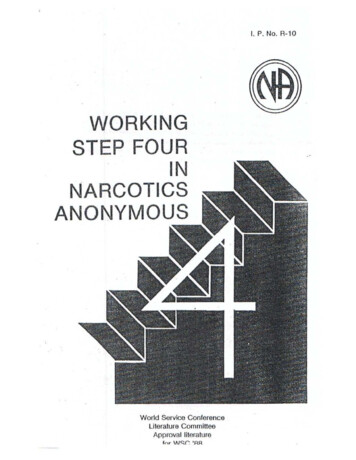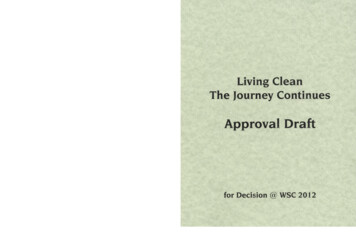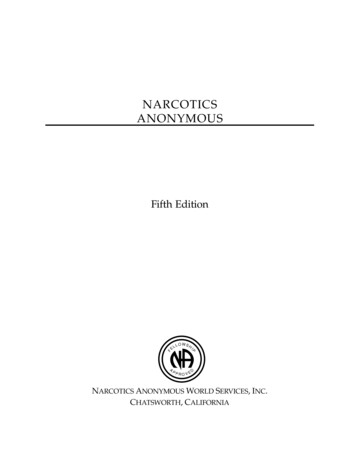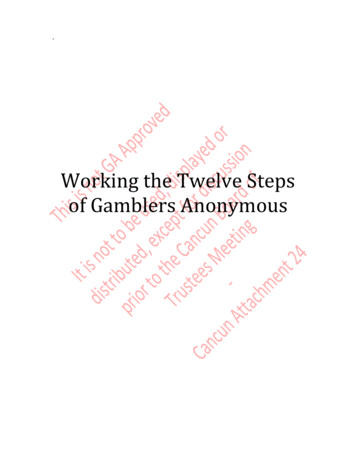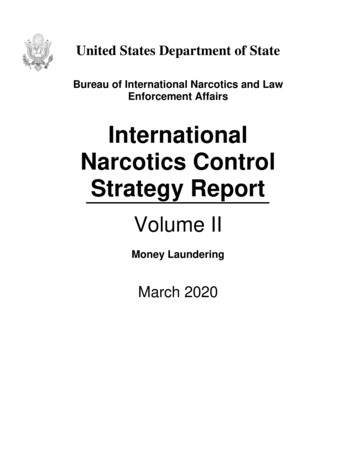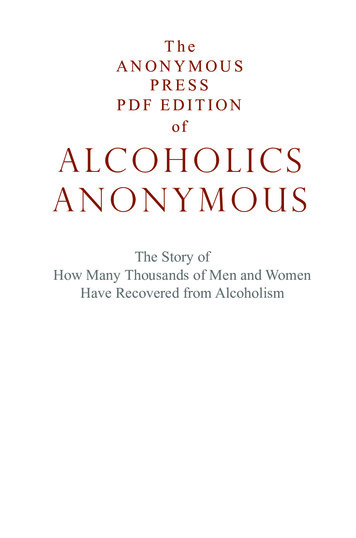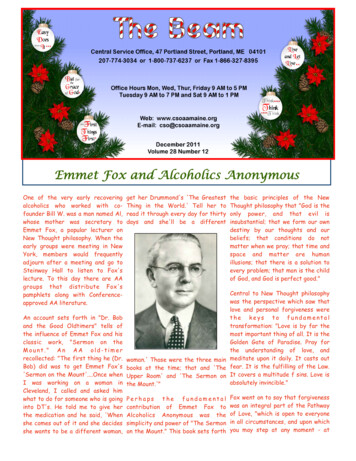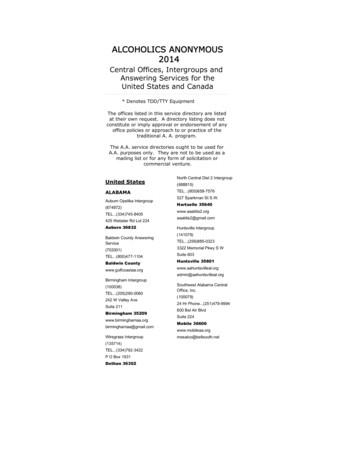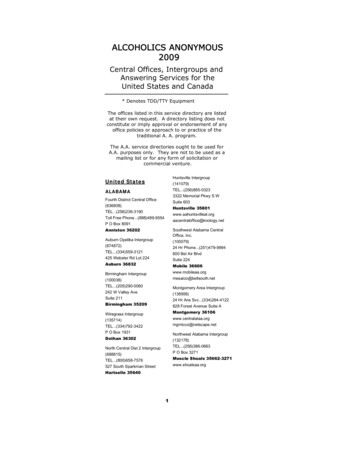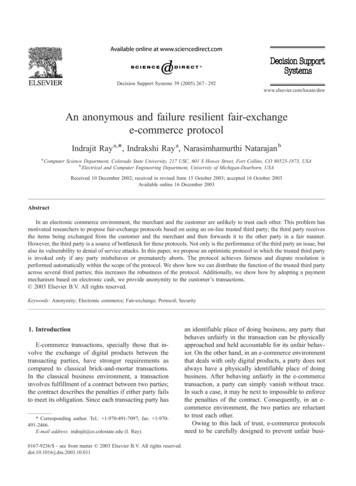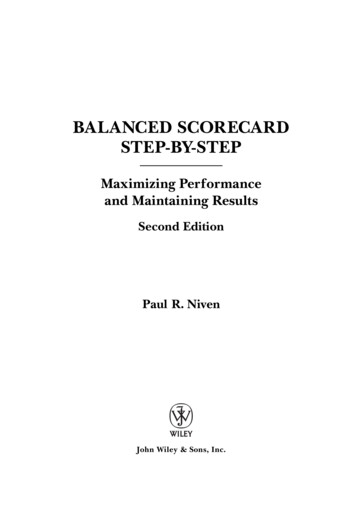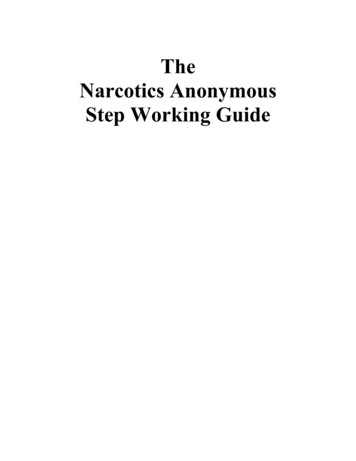
Transcription
TheNarcotics AnonymousStep Working Guide
This is NA Fellowship-approved literature"Copyright 1998, World Service Office, Inc. Reprinted by permission. All rights reserved."PrefaceThe idea for this piece of literature came from the Narcotics Anonymous Fellowshipitself. Beginning in the early 1980s, we began receiving Twelve Step guides and stepworksheets along with requests that we develop a standard set of guides for the NAFellowship to use in working through the Twelve Steps. Fellowship demand propelledthis project up the NA World Service Conference Literature Committee's prioritywordlists, and finally resulted in the World Service Conference directing the WSCLC togo ahead with the project at WSC'95.The working title for this project for many years was the "Step Writing Guides."However, we recognized that the word "writing" imposed a limitation on members whomay be unable to write or may choose not to use writing as the means for working theTwelve Steps. Therefore, the title became the Step Working Guides.Each chapter includes both narrative and questions. The narrative is meant to provokethought about the questions, but is not meant to be comprehensive. There is a differencein "voice" between the narrative and the questions. The narrative is written in the "we"voice in order to promote unity about what we all have in common: our addiction andrecovery. The questions are written in the individual "I" voice so that each member usingthese guides can personalize the work. The Step Working Guides is a companion piece toIt Works: How and Why. Thorough discussion of each of the Twelve Steps is contained inthat work. Additional information about NA recovery can be found in other NAliterature. If we find that any of the terms used in this book are unfamiliar, we should feelfree to make use of a dictionary.These guides are meant to be used by NA members at any stage of recovery, whether it'sour first time through the steps or we've been living with the steps as our guiding forcefor many years. This book is intentionally written to be relevant to newcomers and tohelp more experienced members develop a deeper understanding of the Twelve Steps. AsNA grows in numbers, in diversity, and in strength and longevity of clean time, we needliterature that will continue to serve the needs of the fellowship1 literature that "grows"along with the fellowship.However, as open and inclusive as we tried to be when writing these guides, we realizedthat we would never be able to write something that captured every member's experiencewith the steps. In fact, we wouldn't have tried to do that, even if we thought it werepossible. This book contains guides to working the Twelve Steps toward recovery; it doesnot contain recovery itself. Recovery is ultimately found in each member's personalexperience with working the steps. You can add to these guides, delete from them, or usethem as they are. It's your choice.
There's probably only one inappropriate way to use these guides: alone. We can'toveremphasize the importance of working with a sponsor in working the steps. In fact, inour fellowship, a sponsor is considered, first and foremost, a guide through the TwelveSteps. If you haven't yet asked someone to sponsor you, please do so before beginningthese guides.Merely reading all the available information about any of the Twelve Steps will never besufficient to bring about a true change in our lives and freedom from our disease. It's ourgoal to make the steps part of who we are. To do that, we have to work them. Hence, theStep Working Guides.Like every piece of NA literature, this was written by addicts for addicts. We hope thatevery member who uses this book will be encouraged and inspired. We are grateful tohave been given the opportunity to participate in this project. Thank you for allowing usto be of service.WSC Literature Committee
Step One"We admitted we were powerless over our addiction, that our lives had becomeunmanageable."A "first" of anything is a beginning, and so it is with the steps: The First Step is thebeginning of the recovery process. The healing starts here; we can't go any further untilwe've worked this step.Some NA members "feel" their way through the First Step1 by intuition; others choose towork Step One in a more systematic fashion. Our reasons for formally working Step Onewill vary from member to member. It may be that we're new to recovery, and we've justfought-and lost-an exhausting battle with drugs. It may be that we've been around awhile,abstinent from drugs, but we've discovered that our disease has become active in someother area of our lives, forcing us to face our powerlessness and the unmanageability ofour lives once again. Not every act of growth is motivated by pain; it may just be time tocycle through the steps again1 thus beginning the next stage of our never-ending journeyof recovery.Some of us find a measure of comfort in realizing that a disease, not a moral failing, hascaused us to reach this bottom. Others don't really care what the cause has been-we justwant out!Whatever the case, it's time to do some step work: to engage in some concrete activitythat will help us find more freedom from our addiction, whatever shape it is currentlytaking. Our hope is to internalize the principles of Step One, to deepen our surrender, tomake the principles of acceptance, humility, willingness, honesty, and open-mindedness afundamental part of who we are.First, we must arrive at a point of surrender. There are many different ways to do this. Forsome of us, the road we traveled getting to the First Step was more than enough toconvince us that unconditional surrender was our only option. Others start this processeven though we're not entirely convinced that we're addicts or that we've really hitbottom. Only in working the First Step do we truly come to realize that we are addicts,that we have hit bottom, and that we must surrender.Before we begin working the First Step, we must become abstinent-whatever it takes. Ifwe're new in Narcotics Anonymous and our First Step is primarily about looking at theeffects of drug addiction in our lives, we need to get clean. If we've been clean awhileand our First Step is about our powerlessness over some other behavior that's made ourlives unmanageable, we need to find a way to stop the behavior so that our surrender isn'tclouded by continued acting out.The Disease of Addiction
What makes us addicts is the disease of addiction-not the drugs, not our behavior, but ourdisease. There is something within us that makes us unable to control our use of drugs.This same "something" also makes us prone to obsession and compulsion in other areasof our lives. How can we tell when our disease is active? When we become trapped inobsessive, compulsive, self-centered routines, endless loops that lead nowhere but tophysical, mental, spiritual, and emotional decay. What does "the disease of addiction" mean to me? Has my disease been active recently? In what way? What is it like when I'm obsessed with something? Does my thinking follow a pattern?Describe. When a thought occurs to me, do I immediately act on it without considering theconsequences? In what other ways do I behave compulsively? How does the self-centered part of my disease affect my life and the lives of those aroundme? How has my disease affected me physically? Mentally? Spiritually? Emotionally?Our addiction can manifest itself in a variety of ways. When we first come to NarcoticsAnonymous, our problem will, of course, be drugs. Later on, we may find out thataddiction is wreaking havoc in our lives in any number of ways.What is the specific way in which my addiction has been manifesting itself mostrecently? Have I been obsessed with a person, place, or thing? If so, how has that gotten in the wayof my relationships with others? How else have I been affected mentally, physically,spiritually, and emotionally by this obsession?DenialDenial is the part of our disease that tells us we don't have a disease. When we are indenial, we are unable to see the reality of our addiction. We minimize its effect. Weblame others, citing the too-high expectations of families, friends, and employers. Wecompare ourselves with other addicts whose addiction seems "worse" than our own. Wemay blame one particular drug. If we have been abstinent from drugs for some time, wemight compare the current manifestation of our addiction with our drug use, rationalizingthat nothing we do today could possibly be as bad as that was! One of the easiest ways totell that we are in denial is when we find ourselves giving plausible but untrue reasons forour behavior. Have I given plausible but untrue reasons for my behavior? What have they been? Have I compulsively acted on an obsession, and then acted as if I had actually planned toact that way? When were those times? How have I blamed other people for my behavior?
How have I compared my addiction with others' addiction? Is my addiction "bad enough"if I don't compare it to anyone else's? Am I comparing a current manifestation of my addiction to the way my life was before Igot clean? Am I plagued by the idea that I should know better? Have I been thinking that I have enough information about addiction and recovery to getmy behavior under control before it gets out of hand? Am I avoiding action because I'm afraid I will be ashamed when I face the results of myaddiction? Am I avoiding action because I'm worried about what others will think?Hitting Bottom: Despair and IsolationOur addiction finally brings us to a place where we can no longer deny the nature of ourproblem. All the lies, all the rationalizations, all the illusions fall away as we stand faceto-face with what our lives have become. We realize we've been living without hope. Wefind we've become friendless or so completely disconnected that our relationships are asham, a parody of love and intimacy. Though it may seem that all is lost when we findourselves in this state, the truth is that we must pass through this place before we canembark upon our journey of recovery. What crisis brought me to recovery? What situation led me to formally work Step One? When did I first recognize my addiction as a problem? Did I try to correct it? If so, how?If not, why not?PowerlessnessAs addicts, we react to the word "powerless" in a variety of ways. Some of us recognizethat a more accurate description of our situation simply could not exist, and admit ourpowerlessness with a sense of relief. Others recoil at the word, connecting it withweakness or believing it to indicate some kind of character deficiency. Understandingpowerlessness - and how admitting our own powerlessness is essential to our recovery will help us get over any negative feelings we may have about the concept.We are powerless when the driving force in our life is beyond our control. Our addictioncertainly qualifies as such an uncontrollable, driving force. We cannot moderate orcontrol our drug use or other compulsive behaviors, even when they are causing us tolose the things that matter most to us. We cannot stop, even when to continue will surelyresult in irreparable physical damage. We find ourselves doing things that we wouldnever do if it weren't for our addiction; things that make us shudder with shame when wethink of them. We may even decide that we don't want to use, that we aren't going to use,and realize we are simply unable to stop when the opportunity presents itself.We may have tried to abstain from drug use or other compulsive behaviors - perhaps withsome success - for a period of time without a program, only to find that our untreatedaddiction eventually takes us right back to where we were before. In order to work the
First Step, we need to prove our own individual powerlessness to ourselves on a deeplevel. Over what, exactly, am I powerless? I've done things while acting out on my addiction that I would never do when focusing onrecovery. What were they? What things have I done to maintain my addiction that went completely against all mybeliefs and values? How does my personality change when I'm acting out on my addiction? (For example:Do I become arrogant? Self-centered? Mean-tempered? Passive to the point where I can'tprotect myself? Manipulative? Whiny?) Do I manipulate other people to maintain my addiction? How? Have I tried to quit using and found that I couldn't? Have I quit using on my own andfound that my life was so painful without drugs that my abstinence didn't last very long?What were these times like? How has my addiction caused me to hurt myself or others?UnmanageabilityThe First Step asks us to admit two things: one, that we are powerless over our addiction;and two, that our lives have become unmanageable. Actually, we would be hard pressedto admit one and not the other. Our unmanageability is the outward evidence of ourpowerlessness. There are two general types of unmanageability: outwardunmanageability, the kind that can be seen by others; and inner, or personal,unmanageability.Outward unmanageability is often identified by such things as arrests, job losses, andfamily problems. Some of our members have been incarcerated. Some have never beenable to sustain any kind of relationship for more than a few months. Some of us havebeen cut off from our families, asked never again to contact them.Inner or personal unmanageability is often identified by unhealthy or untrue beliefSystems about ourselves, the world we live in, and the people in our lives. We maybelieve we're worthless. We may believe that the world revolves around us -not just thatit should, but that it does. We may believe that it isn't really our job to take care ofourselves; someone else should do that. We may believe that the responsibilities theaverage person takes on as a matter of course are just too large a burden for us to bear.We may over or under react to events in our lives. Emotional volatility is often one of themost obvious ways in which we can identify personal unmanageability. What does unmanageability mean to me? Have I ever been arrested or had legal trouble as a result of my addiction? Have I everdone anything I could have been arrested for if only I was caught? What have thosethings been?
What trouble have I had at work or school because of my addiction? What trouble have Ihad with my family as a result of my addiction? What trouble have I had with my friends as a result of my addiction? Do I insist on having my own way? What effect has my insistence had on myrelationships? Do I consider the needs of others? What effect has my lack of consideration had on myrelationships? Do I accept responsibility for my life and my actions? Am I able to carry out my dailyresponsibilities without becoming overwhelmed? How has this affected my life? Do I fall apart the minute things don't go according to plan? How has this affected mylife? Do I treat every challenge as a personal insult? How has this affected my life? Do I maintain a crisis mentality, responding to every situation with panic? How has thisaffected my life? Do I ignore signs that something may be seriously wrong with my health or with mychildren, thinking things will work out somehow? Describe. When in real danger, have I ever been either indifferent to that danger or somehowunable to protect myself as a result of my addiction? Describe. Have I ever harmed someone as a result of my addiction? Describe. Do I have temper tantrums or react to my feelings in other ways that lower my selfrespect or sense of dignity? Describe. Did I take drugs or act out on my addiction to change or suppress my feelings? What wasI trying to change or suppress?ReservationsReservations are places in our program that we have reserved for relapse. They may bebuilt around the idea that we can retain a small measure of control, something like,"Okay, I accept that I can't control my using, but I can still sell drugs, can't I?" Or we maythink we can remain friends with the people we used with or bought drugs from. We maythink that certain parts of the program don't apply to us. We may think there's somethingwe just can't face clean-a serious illness, for instance, or the death of a loved one - andplan to use if it ever happens. We may think that after we've accomplished some goal,made a certain amount of money, or been clean for a certain number of years, then we'llbe able to control our using. Reservations are usually tucked away in the back of ourminds; we are not fully conscious of them. It is essential that we expose any reservationswe may have and cancel them, right here, right now. Have I accepted the full measure of my disease?
Do I think I can still associate with the people connected with my addiction? Can I stillgo to the places where I used? Do I think it's wise to keep drugs or paraphernalia around,just to "remind myself" or test my recovery? If so, why? Is there something I think I can't get through clean, some event that might happen thatwill be so painful that I'll have to use to survive the hurt? Do I think that with some amount of clean time, or with different life circumstances, I'dbe able to control my using? What reservations am I still holding on to?SurrenderThere's a huge difference between resignation and surrender. Resignation is what we feelwhen we've realized we're addicts but haven't yet accepted recovery as the solution to ourproblem. Many of us found ourselves at this point long before coming to NarcoticsAnonymous. We may have thought that it was our destiny to be addicts, to live and die inour addiction. Surrender, on the other hand, is what happens after we've accepted theFirst Step as something that is true for us and have accepted that recovery is the solution.We don't want our lives to be the way they have been. We don't want to keep feeling theway we've been feeling. What am I afraid of about the concept of surrender, if anything? What convinces me thatI can't use successfully anymore? Do I accept that I'll never regain control, even after a long period of abstinence? Can I begin my recovery without a complete surrender? What would my life be like if I surrendered completely? Can I continue my recovery without complete surrender?Spiritual PrinciplesIn the First Step, we will focus on honesty, open-mindedness, willingness, humility, andacceptance.The practice of the principle of honesty from the First Step starts with admitting the truthabout our addiction, and continues with the practice of honesty on a daily basis. When wesay "I'm an addict" in a meeting, it may be the first truly honest thing we've said in a longtime. We begin to be able to be honest with ourselves and, consequently, with otherpeople. If I've been thinking about using or acting out on my addiction in some other way, have Ishared it with my sponsor or told anyone else? Have I stayed in touch with the reality of my disease, no matter how long I've hadfreedom from active addiction?
Have I noticed that, now that I don't have to cover up my addiction, I no longer need tolie like I did? Do I appreciate the freedom that goes along with that? In what ways have Ibegun to be honest in my recovery?Practicing the principle of open-mindedness found in Step One mostly involves beingready to believe that there might be another way to live and being willing to try that way.It doesn't matter that we can't see every detail of what that way might be, or that it may betotally unlike anything we've heard about before; what matters is that we don't limitourselves or our thinking. Sometimes we may hear NA members saying things that soundtotally crazy to us, things like "surrender to win" or suggestions to pray for someone weresent. We demonstrate open-mindedness when we don't reject these things withouthaving tried them. What have I heard in recovery that I have trouble believing? Have I asked my sponsor orthe person I heard say it, to explain it to me? In what ways am I practicing open-mindedness?The principle of willingness contained in the First Step can be practiced in a variety ofways. When we first begin to think about recovery, many of us either don't really believeit's possible for us or just don't understand how it will work, but we go ahead with theFirst Step anyway-and that's our first experience with willingness. Taking any action thatwill help our recovery shows willingness: going to meetings early and staying late,helping set up meetings, getting other NA members' phone numbers and calling them. Am I willing to follow my sponsor's direction? Am I willing to go to meetings regularly? Am I willing to give recovery my best effort? In what ways?The principle of humility, so central to the First Step, is expressed most purely in oursurrender. Humility is most easily identified as an acceptance of who we truly are neither worse nor better than we believed we were when we were using, just human. Do I believe that I'm a monster who has poisoned the whole world with my addiction? Do I believe that my addiction is utterly inconsequential to the larger society around me?Or something in between? Do I have a sense of my relative importance within my circle of family and friends? Insociety as whole? What is that sense? How am I practicing the principle of humility in connection with this work on the FirstStep?To practice the principle of acceptance, we must do more than merely admit that we'readdicts. When we accept our addiction, we feel a profound inner change that isunderscored by a rising sense of hope. We also begin to feel a sense of peace. We cometo terms with our addiction, with our recovery, and with the meaning those two realitieswill come to have in our lives. We don't dread a future of meeting attendance, sponsor
contact, and step work; instead, we begin to see recovery as a precious gift, and the workconnected with it as no more trouble than other routines of life. Have I made peace with the fact that I'm an addict? Have I made peace with the things I'll have to do to stay clean? How is acceptance of my disease necessary for my continued recovery?Moving OnAs we get ready to go on to Step Two, we'll probably find ourselves wondering if we'veworked Step One well enough. Are we sure it's time to move on? Have we spent as muchtime as others may have spent on this step? Have we truly gained an understanding of thisstep?Many of us have found it helpful to write about our understanding of each step as weprepare to move on. How do I know it's time to move on? What is my understanding of Step One? How has my prior knowledge and experience affected my work on this step?We've come to a place where we see the results of our old way of life and accept that anew way is called for, but we probably don't yet see how rich with possibilities the life ofrecovery is. It may be enough just to have freedom from active addiction right now, butwe will soon find that the void we have been filling with drugs or other obsessive andcompulsive behaviors begs to be filled. Working the rest of the steps will fill that void.Next on our journey toward recovery is Step Two.
Step Two“We came to believe that a Power greater than ourselves could restore us to sanity."Step One strips us of our illusions about addiction; Step Two gives us hope for recovery.The Second Step tells us that what we found out about our addiction in the First Step isnot the end of the story. The pain and insanity with which we have been living areunnecessary, says Step Two. They can be relieved and, in time, we will learn to livewithout them through working the Twelve Steps of Narcotics Anonymous.The Second Step fills the void we feel when we've finished Step One. As we approachStep Two, we begin to consider that maybe, just maybe, there's a Power greater thanourselves-a Power capable of healing our hurt, calming our confusion, and restoring oursanity.When we were new in the program, many of us were puzzled by this step's implicationthat we had been insane. From acknowledging our powerlessness to admitting our"insanity" seemed an awfully large leap. However, after being around the program for awhile, we began to understand what this step was really about. We read the Basic Textand found that our insanity was defined there as "repeating the same mistakes andexpecting different results." We could certainly relate to that! After all, how many timeshad we tried to get away with something we had never gotten away with before, eachtime telling ourselves, "It will be different this time." Now, that's insane! As we live theprinciples of this step for many years, we discover how deep our insanity actually runs;we often find that the Basic Text definition just scratches the surface.Some of us resisted this step because we thought it required us to be religious. Nothingcould be further from the truth. There is nothing, absolutely nothing, in the NA programthat requires a member to be religious. The idea that "anyone may join us, regardless of.religion or lack of religion" is fiercely defended by our fellowship. Our members strive tobe inclusive in this regard and do not tolerate anything that compromises theunconditional right of all addicts to develop their own individual understanding of aPower greater than themselves. This is a spiritual, not religious, program.The beauty of the Second Step is revealed when we begin to think about what our HigherPower can be. We are encouraged to choose a Power that is loving, caring, and-mostimportantly - able to restore us to sanity. The Second Step does not say, "We came tobelieve in a Power greater than ourselves." It says, "We came to believe that a Powergreater than ourselves could restore us to sanity." The emphasis is not on who or whatthis Power is, but on what this Power can do for us. The group itself certainly qualifies asa Power greater than ourselves. So do the spiritual principles contained in the TwelveSteps. And, of course, so does the understanding any one of our individual members hasof a Higher Power. As we stay clean and continue to work this step, we discover that nomatter how long our addiction has gone on and how far our insanity has progressed,there's no limit to the ability of a Power greater than ourselves to restore our sanity.
HopeThe hope we get from working Step Two replaces the desperation with which we cameinto the program. Every time we had followed what we'd thought would be a path out ofour addiction - medicine, religion, or psychiatry, for instance - we found they only tookus so far; none of these was sufficient for us. As we ran out of options and exhausted ourresources, we wondered if we'd ever find a solution to our dilemma, if there wereanything in the world that worked. In fact, we may have been slightly suspicious whenwe first came to Narcotics Anonymous, wondering if this was just another method thatwouldn't work, or that wouldn't work well enough for us to make a difference.However, something remarkable occurred to us as we sat in our first few meetings. Therewere other addicts there who had used drugs just as we had, addicts who were now clean.We believed in them. We knew we could trust them. They knew the places we'd been toin our addiction-not just the using hangouts, not just the geographic locations, but thehangouts of horror and despair our spirits had visited each time we'd used. Therecovering addicts we met in NA knew those places as well as we did because they hadbeen there themselves.It was when we realized that these other members - addicts like ourselves - were stayingclean and finding freedom that most of us first experienced the feeling of hope. We mayhave been standing with a group of members after a meeting. We may have beenlistening to someone share a story just like our own. Most of us can recall that moment,even years later -and that moment comes to all of us.Our hope is renewed throughout our recovery. Each time something new is revealed to usabout our disease, the pain of that realization is accompanied by a surge of hope. Nomatter how painful the process of demolishing our denial may be, something else is beingrestored in its place within us. Even if we don't feel like we believe in anything, we dobelieve in the program. We believe that we can be restored to sanity, even in the mosthopeless times, even in our sickest areas. What do I have hope about today?InsanityIf we have any doubts about the need for a renewal of sanity in our lives, we're going tohave trouble with this step. Reviewing our First Step should help us if we're havingdoubts. Now is the time to take a good look at our insanity. Did I believe I could control my using? What were some of my experiences with this, andhow were my efforts unsuccessful? What things did I do that I can hardly believe I did when I look back at them? Did I putmyself in dangerous situations to get drugs? Did I behave in ways of which I'm nowashamed? What were those situations like? Did I make insane decisions as a result of my addiction? Did I quit jobs, leave friendshipsand other relationships, or give up on achieving other goals for no reason other than thatthose things interfered with my using?
Did I ever physically injure myself or someone else in my addiction?Insanity is a loss of our perspective and our sense of proportion. For example, we maythink that our personal problems are more important than anyone else's; in fact, we maynot even be able to consider other people's needs at all. Small problems become majorcatastrophes. Our lives get out of balance. Some obvious examples of insane thinking arethe belief that we can stay clean on our own, or the belief that using drugs was our onlyproblem and that everything is fine now just because we're clean. In NarcoticsAnonymous, insanity is often described as the belief that we can take something outsideourselves-drugs1 power, sex, food-to fix what's w
The idea for this piece of literature came from the Narcotics Anonymous Fellowship itself. Beginning in the early 1980s, we began receiving Twelve Step guides and step worksheets along with requests that we develop a standard set of guides for the NA Fellowship to use in work
